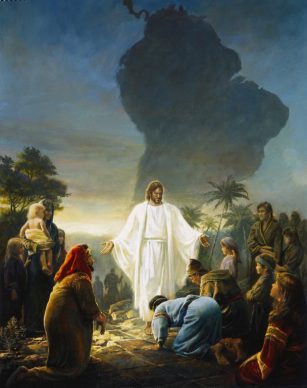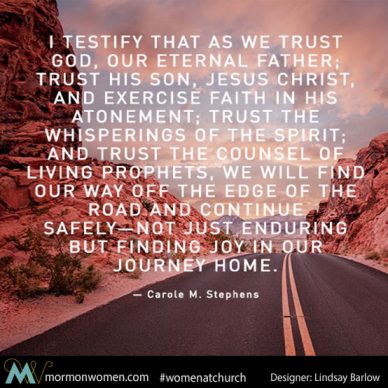The Gospel Doctrine lesson #41; scriptures 3 Nephi 22-26
Jesus’s visit to the Americas is a life’s ministry condensed into just a few brief but powerful  encounters. The parallels between Christ’s actions and teachings in the Old and New World are significant: he healed the sick, preached a new gospel that replaced the Law of Moses, instituted the sacrament, ordained a priesthood, and prayed with and for the people. In 3 Nephi 22 – 26, as his visit neared its close, Christ taught from written text, or holy scripture. In these passages the gospel of Christ is distilled to a rarified essence: Jesus cites Isaiah, Samuel the Lamanite, and Malachi. There is some irony in this appeal to scripture, as if the Messiah needed to borrow from their authority. Yet, by citing the authority of these prophets, Jesus in turn lends them his own divine authority. Extracting words from the past, He intensifies their spiritual power and reaffirms their relevance to present and future eras.
encounters. The parallels between Christ’s actions and teachings in the Old and New World are significant: he healed the sick, preached a new gospel that replaced the Law of Moses, instituted the sacrament, ordained a priesthood, and prayed with and for the people. In 3 Nephi 22 – 26, as his visit neared its close, Christ taught from written text, or holy scripture. In these passages the gospel of Christ is distilled to a rarified essence: Jesus cites Isaiah, Samuel the Lamanite, and Malachi. There is some irony in this appeal to scripture, as if the Messiah needed to borrow from their authority. Yet, by citing the authority of these prophets, Jesus in turn lends them his own divine authority. Extracting words from the past, He intensifies their spiritual power and reaffirms their relevance to present and future eras.
But why Isaiah 54 (quoted in 3 Nephi 22)? Choosing from centuries of scripture, why does Jesus cite this chapter? What essential message does it give? Like many of Isaiah’s texts, this one is rich with imagery and symbol. These symbols reveal layered meanings, apt expression for the diversity of human experience.
Music and Motherhood: Isaiah’s chapter opens with an imperative:
“Sing! O barren, thou that didst not bear; break forth into singing, and cry aloud, thou that didst not travail with child: for more are the children of the desolate than the children of the married wife, saith the Lord.”
This is a psalm of praise, directed to a woman in distress. Abandoned, alone, and childless, the Lord comforts her and promises her an abundant family life, the fulfillment of her desires. Her family, which is also the family of the Lord, can now be established with bonds of love and peace that continue forever. Isaiah’s deepest symbol of joy and abundance is motherhood. But this is a role that comes with pain as well as joy. Again speaking to this woman the Lord says in 3 Nephi 22:7-8,
“For a small moment have I forsaken thee, but with great mercies will I gather thee. In a little wrath I hid my face from thee for a moment, but with everlasting kindness will I have mercy on thee, saith the Lord thy Redeemer.”
Cynthia Hallen illuminates these verses with a reference to Jewish childbirth custom.
“Among orthodox Jews,a husband is not allowed to watch his wife going through the labor of childbirth. He sits in the corner of the delivery room with his back turned so that she will not feel embarrassed or immodest in her unavoidable hour of agony. He does not abandon her, although she may feel very much alone. The woman recites or sings psalms as she endures contractions. When the pain becomes too great for her to continue singing, the husband takes over, reciting psalms for her.”
Applying this childbirth custom to its symbolic significance for the people of God, Hallen continues,
“Although Zion cannot see the Lord in the time of her probation, when she weeps, he weeps with her; when she sings, he rejoices with her. The relationship between the Savior and Zion is one of ‘everlasting kindness.’” (Hallen 45 “Redeeming the Desolate Woman: The Message of Isaiah 54 and 3 Nephi 22”)
The Tent of Zion: 3 Nephi 22:2 gives us another vivid metaphor:
“Enlarge the place of thy tent, and let them stretch forth the curtains of thy habitations; spare not, lengthen thy cords and strengthen thy stakes.”
These words are woven throughout the Doctrine and Covenants, and the idea of Zion’s establishment and expansion is one of the foundational ideas of the restored gospel. It has become the metaphor for our church. The impact of this image on the people at Bountiful? We read in 4 Nephi verse 17, after Christ’s departure, that these people became “one, the children of Christ, and heirs to the kingdom of God.” Are we enlarging this tent of Zion? Are we becoming one?
A Covenant Stronger than Mountains: Another metaphor or symbol, 3 Nephi 22:10-11:
“For the mountains shall depart and the hills be removed, but my kindness shall not depart from thee, neither shall the covenant of my peace be removed, saith the Lord that hath mercy on thee. O thou afflicted, tossed with tempest, and not comforted! Behold, I will lay thy stones with fair colors, and lay thy foundations with sapphires.”
Remember to whom Christ is speaking. These listeners had experienced the tangible reality of his words. They had seen mountains crumble and tempests ravage their homes. The foundations of their society had been destroyed by vice and selfish power struggles. But Christ reminds them that these calamities, whether natural or human in origin, don’t nullify God’s plan. Even the law of Moses, itself symbolized by the mountain Sinai, had departed, but this drastic change in lifestyle could never mean a change in God’s love.
When Christ finishes expounding Isaiah 54 to the people, he reminds them to “search these things diligently” (3 Nephi 23:1). Why? Not simply to show our devotion or demonstrate our obedience to commandments. We search the scriptures because they give us words of life. They tell us that that there is a plan, that God keeps his promises of peace, that our human mess can be made right, our pain healed, our sorrows turn to joy. This is the essence of Christ’s gospel.
Related Mormon Women Project Interviews
To Sit At The Feet of Christ, Christie Kay Hansen Frandsen
“I think lowering the age for sister missionaries was huge. Gigantically huge. So many more girls are going to go on missions because at age nineteen they can plan it into their life. At age twenty one, they couldn’t make plans. I’ve seen a real change in the girls in my seminary classes. They are really serious about studying the scriptures and serious about seminary. And then as these girls come back, they are going to be Gospel Doctrine teachers in their student wards, in their young adult wards. They are going to be Relief Society teachers and they are going to be using the scriptures. They are going to be scripture scholars because they have studied them. And that’s going to be wonderful for the women who don’t go on missions. They are going to see their sisters in front of them teaching with great power and authority and knowing and loving those scriptures. That is going to have an impact too. So I think that was maybe the most single most important thing to ever happen to really helping women understand and be serious about studying the scriptures.”
Sharing the Burden, Dawn
“That was a moment where I really had to reconcile my faith. If you lose your testimony in prayer, what do you have?…I decided—and this was the action on my part—to go to the scriptures. I looked up all these scriptures on prayer. Reading the Lord’s Prayer really changed my heart and my mind. There’s nothing that says, ‘You give me a list of whatever you want and I’ll be sure to fulfill it.’ Instead, it says to come close to the Lord so His will can be made manifest in your life.
My prayer changed. I stopped praying for a specific outcome…It’s not like I read one scripture and it changed my life. But my willingness to pray about my question and to read about it and to ask God for clarification activated the Atonement.”
Other Related Women’s Voices
Defenders of the Proclamation of the Family, Bonnie L. Oscarson
“All of us—women, men, youth, and children, single or married—can work at being homemakers. We should “make our homes” places of order, refuge, holiness, and safety. Our homes should be places where the Spirit of the Lord is felt in rich abundance and where the scriptures and the gospel are studied, taught, and lived. What a difference it would make in the world if all people would see themselves as makers of righteous homes. Let us defend the home as a place which is second only to the temple in holiness.”

Looking for additional perspectives on this lesson? We recommend Mormon Sunday School, Meridian Magazine and LDSLiving.
